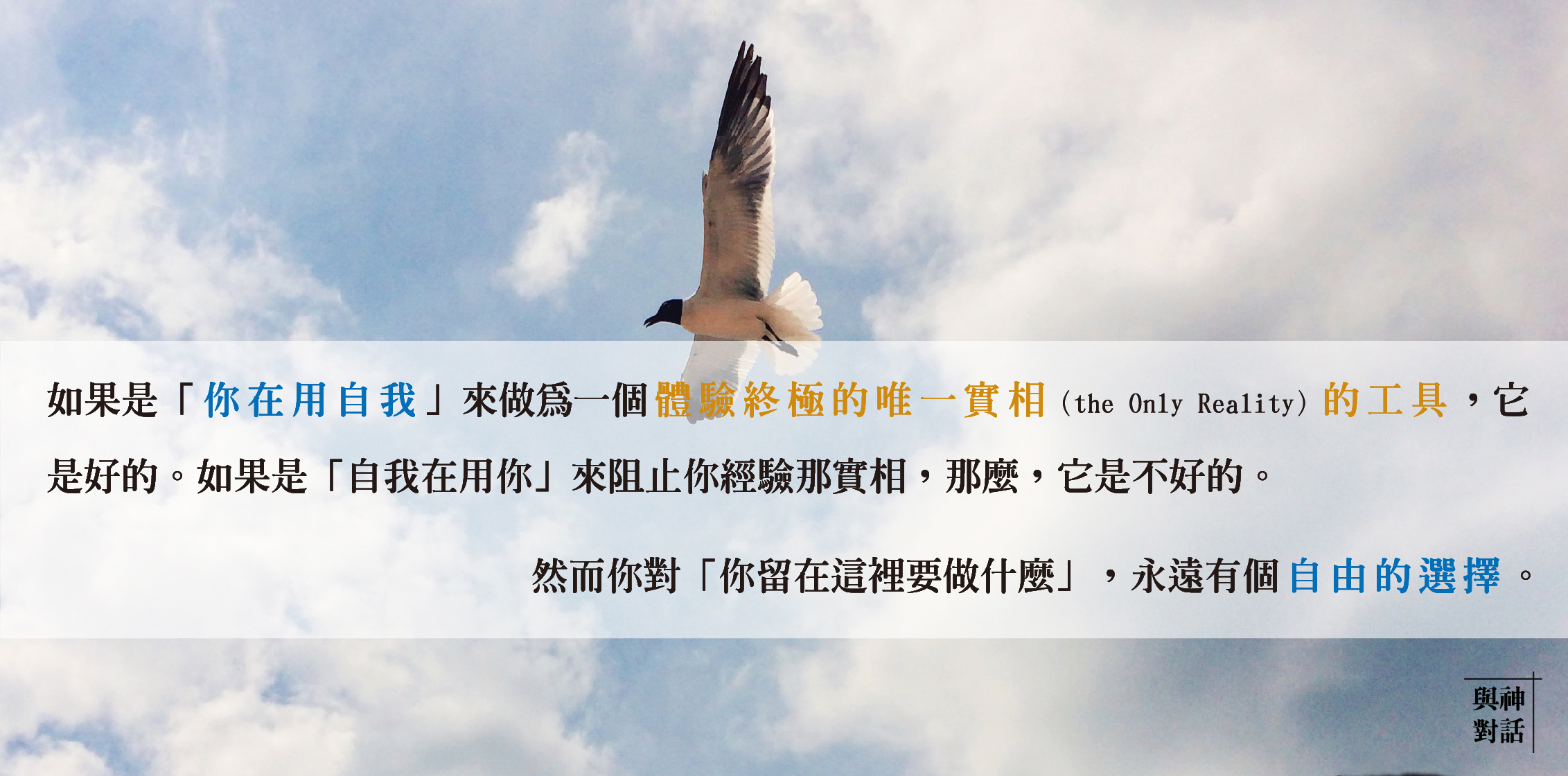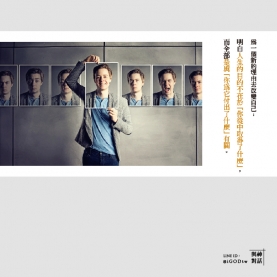
聽神談【關於人類的「小我心態、自我」(ego)】
尼爾:到底有「自我」(ego)是好,還是不好呢?
這是一個大哉問!
你們進入相對性的世界——我所謂的「相對領域」(the Realm of the Relative)——是為了體驗你們在「絕對領域」(the Realm of the Absolute)裡無法體驗的東西。你所尋求的經驗是你真正是誰。在「絕對領域」裡,你能夠知道這點,但你卻無法體驗它。你靈魂的欲望是經驗性地認識它自己 (know itself experientially) 。在「絕對領域」裡,你無法經驗你是誰的任何面向(aspect),那是因為,在絕對領域裡沒有「你所不是」的面向。
絕對就只是那樣——絕對。每件東西的全部。起點以及終點,中間空無一物。「絕對」沒有級次之分。事情的級次只存在於「相對」之中。
「相對領域」被造出來,以便在經驗上你能夠認識自己 (Self)的莊嚴華麗。在「絕對領域」裡,只有壯麗,別無他物,所以壯麗「不存在」。也就是說,它無法被經驗,它無法在經驗上被了解,因為在沒有「不壯麗」的東西的情況下,沒有辦法經驗壯麗。事實上,你與每樣東西都是一體的。那即你的壯麗!然而,當你與每樣東西都是一體時,你卻無法認識到「與每樣東西都是一體的壯麗」,因為沒有別的東西。所以,與每樣東西合一全無意義(means nothing)。在你的經驗裡,你只是「你」,而你體驗不到那莊嚴華麗。
你要體驗「與每樣東西都是一體的壯麗」的唯一方法,就是要有一些情況或狀態,在其中與每樣東西「並非一體」是可能的。然而,既然在絕對領域——即終極實相裡——每樣東西都是一體的,某東西與每樣東西不是一體是不可能的。
可是,「與每樣東西不一體的幻覺」並非不可能。那麼,「相對領域」便是為了這個目的而被創造的。它就像《愛麗絲夢遊仙境》的世界,在其中,事物不是它們看起來彷彿是的東西,在其中事物彷彿是「它們不是」的樣子。
你的自我(ego)就是你創造這幻覺的主要工具。它容許你去想像你自己是與「你的其他部分」分開的。它是「認為你是一個獨自個體」的那部分的你。
你並非一個獨自個體(individual),然而你必須被個別化以便理解和領會「整體的經驗」。因此,就此而言,有個自我是「好」的。就你想要去做的事而言,它是「好」的。
然而,就你在嘗試做的事而言,太多的自我「並不好」。因為你在嘗試做的是:利用分離的幻覺以更加理解和領會一體——即你真正是誰——的經驗。
可是當自我被放得那麼大,以致你所能看到的只是分離的自己(separate Self),所有體驗合一的自己(unified Self)的機會都失去了,而你也就迷失了。你真的是迷失在自己的幻覺世界裡,你可能好多個人世(lifetimes)都仍迷失在幻想裡,直到你終於將自己帶出來,或直到別人——另一個靈魂——將你拉出來。那就是「將你還給你自己」 (giving you back to yourself,意思和前兩頁的返回你真正的自己(back to yourSelf)、返回他們真正的自己(back to themSelf)相同。)的意思,這也是基督教會的「救世主」觀念。但是教會的唯一錯誤,是宣稱他們自己和他們的宗教是「得救」的唯一途徑,因此再度加強了分離的幻覺——而他們想要救你脫離的,正是那個幻覺啊!。
所以,你問有個自我是否是好的,那是個非常大的問題。全都依據你想做什麼而定。

如果是「你在用自我」來做為一個體驗終極的唯一實相( the Only Reality)的工具,它是好的。如果是「自我在用你」來阻止你經驗那實相,那麼,它是不好的。當它達到「阻止你做你到這裡(地球)來要做的事」的程度時,它是「不好的」。
然而你對「你留在這裡要做什麼」,永遠有個自由的選擇。如果你覺得不去「體驗你自己為一體的一部分」是件愉快的事,你也會被給予「目前沒有那種體驗」的選擇。只有當你受夠了分離、受夠了幻覺、受夠了寂寞和痛苦時,你才會想要尋找回家的路,然後你將發現我在那裡——我一直(always)在那裡,以所有的方式(in all ways)。
摘自《與神為友》第5章
Neale: an You help me here? Is it good to have an ego, or not?
That's a big question.
You've entered the relative world—what I call the Realm of the Relative—in order to experience what you cannot experience in the Realm of the Absolute. What you seek to experience is Who You Really Are. In the Realm of the Absolute, you can know this, but you cannot experience it. The desire of your soul is to know itself experientially. The reason that you cannot experience any aspect of Who You Are in the Realm of the Absolute is that in this realm, there is no aspect you are not.
The Absolute is just that—the absolute. The All of Everything. The Alpha and the Omega, with nothing in between. There are no degrees of "Absoluteness." Degrees of things can only exist in the Relative.
The Realm of the Relative was created so that you can know your Self as magnificent, experientially. In the Realm of the Absolute, there is nothing but magnificence, and so magnificence "is not." That is, it cannot be experienced, it cannot be known experientially, because there is no way to experience magnificence in the absence of that which is not magnificent. In truth, you are One with everything. That is your magnificence! Yet you cannot know the magnificence of being One with everything while you are One with everything, because there is nothing else, and so, being One with everything means nothing. In your experience, you are simply "you," and you have no experience of the magnificence of that.
The only way for you to experience the magnificence of being One with everything is for there to be some state or condition in which not being One with everything is possible. Yet since everything is One in the Realm of the Absolute—which is the ultimate reality—something not being One with everything is impossible.
What is not impossible, however, is the illusion of not being One with everything, It was for the purpose of creating this illusion, then, that the Realm of the Relative was created. It is like an Alice-in-Wonderland world, in which things are not what they seem to be, and in which things seem to be what they are not.
Your ego is your chief tool in creating this illusion. It is that device which allows you to imagine your Self as separate from All the Rest of You. It is the part of you that thinks of you as being an individual.
You are not an individual, yet you must be individualized in order to comprehend and appreciate the experience of the whole. And so in this sense, it is "good" to have an ego. Given what you are trying to do, it is "good."
Yet too much ego is—given what you are trying to do— "not good." That's because what you are trying to do is use the illusion of separateness to better comprehend and appreciate the experience of Oneness, which is Who You Really Are.
When the ego becomes so enlarged that all you can see is the separate Self, all chance of experiencing the unified Self is gone, and you are lost. You have literally become lost in the world of your illusion, and you may remain lost in that illusion for many lifetimes, until you finally bring your Self out of it, or until somebody else—another soul-pulls you out. This is what is meant by "giving you back to yourself." This is what the Christian churches meant by their concept of a "savior." The only mistake those churches made was in declaring themselves and their religions to be the only way to be "saved," thus reinforcing once again the illusion of separateness—the very illusion from which they would seek to save you!
So, you ask if it is good to have an ego, and that is a very large question. It all depends on what you are trying to do.
If you are using the ego as a tool with which to ultimately experience the Only Reality, it is good. If the ego is using you to stop you from experiencing that reality, then it is not good. To the degree that it is stopping you from doing what you came here to do, it is "not good."
Yet you are always at free choice about what you remain here to do. If you find it enjoyable to not experience your Self as part of the One, you will be given the choice of not having that experience just now. Only when you've had enough of the separateness, enough of the illusion, enough of the loneliness and the painfulness, will you seek to find your way home, and then you will find that I will be there—that I have always been there.
In All Ways.










